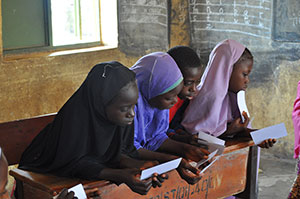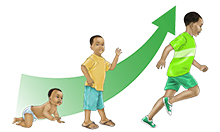
Since 2012, SPRING/Nigeria has worked with 5 PEPFAR implementing partners (STEER, SMILE, ARFH, HIFAS, and WEWE) and civil society organizations (CSO) to roll out the Nigerian Federal Ministry of Health (FMOH)-approved infant and young child feeding (IYCF) package. Having trained more than 2,400 people on IYCF with SPRING support, our partners wanted to reach beyond the first 1,000 days from conception to age 2 to address the nutritional needs of orphans and other vulnerable children (OVCs) aged 2-17 that they work with, especially those affected by HIV.
SPRING is developing a custom nutrition training package that CSO partners can use with the OVC they serve. The training makes use of the the Go, Grow, Glow nutrition curriculum, initially developed for use in the United States and since adapted for use in Ghana, Zambia, Tanzania, and Mozambique among other countries. The curriculum, divided into modules targeting three age groups, will build the nutrition counseling skills of CSO staff and volunteers who work directly with these children through ECD centers and kids clubs.
In July 2016, SPRING tested key concepts in the training package with the volunteers who work in the kids clubs and ECD centers and with a sample of children within each age group.
The concept testing sought to answer the following questions:
- Are the proposed key messages appropriate for each age group?
- Will the proposed activities for each age group result in knowledge gained and interest in changing a given behavior?
- Are the illustrations contextually appropriate and well understood?
- Do the kids enjoy the activities?
- Are the proposed activities feasible with the resources available to and the context of the kids clubs and ECD centers?
The training and associated SBCC materials will be finalized in August and a training of trainers (TOT) will be conducted in September with OVC partners and relevant federal and state ministry counterparts. As SPRING’s office in Nigeria will close at the end of September, the partners will use the materials to implement the training throughout the 16 Nigerian states where SPRING has been active.
